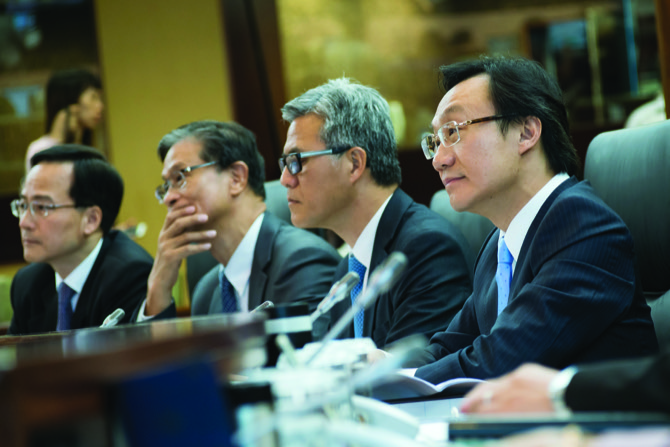The Secretary for Social Affairs and Culture, Alexis Tam, revealed yesterday at the Legislative Assembly (AL) that he agrees with the criminalization of illegal guesthouse accommodation operations. Tam’s view is contrary to the opinion of Secretary for Security Wong Sio Chak, who said during the policy address presentation that there are other ways to solve the issue.
Yesterday was the second day of the presentation of the policy address at the AL for the sectors Tam supervises. Lawmakers Song Pek Kei and Pereira Coutinho posed questions regarding illegal guesthouse accommodation.
In Coutinho’s opinion, matters surrounding illegal hotels should not be taken care of by Tam’s sector. Instead, they should be handled by the security forces.
“These works should be conducted by police officers. I hope you can talk with the Chief Executive in order to forward this task to the police force,” said Coutinho, adding that “illegal guesthouses are the hotbeds of crime. They should be a responsibility of the police authority.”
In reply to the lawmakers, Tam noted that illegal guesthouses have been one of his and his colleagues’ concerns over the past few years, “especially my colleagues from the Macao Government Tourism Office (MGTO).”
“We agree that laws should be amended with respect to illegal hostels,” said Tam. According to the secretary, since the city established a regulation on illegal guesthouse accommodation operations, MGTO has been the department responsible for cracking down on these illegal operations. Nevertheless, the Public Security Police Force (PSP) has also been accompanying MGTO inspectors during inspections of illegal guesthouses.
“I personally feel that this [the cooperation between MGTO and PSP in cracking down illegal hotels] is highly inefficient, and it wastes human resources,” declared Tam.
According to Tam, MGTO has identified 1,239 illegal hostels so far.
“Everyone can picture [the seriousness]. The number of illegal guesthouse accommodation indeed allows us to see that problems exist,” said Tam.
In the opinion of the Secretary, it is dangerous for office workers to crack down on illegal guesthouses.
“We need police officers. We hope that there can be armed police officers conducting inspections of illegal guesthouses,” said Tam, adding that “if the law is to be amended, and if illegal hostel operations are to be criminalized, then I believe that there will be an effect on some violations as well as some effects on visitors.”
“Because the cost to commit the crime is too low, sometimes there is just a fine,” said Tam, adding that “some of my colleagues have proposed it [criminalization of illegal guesthouse accommodation operations], but, of course, I know that Secretary for Security, Wong Sio Chak, does not agree, and I respect [his opinion].”
“We hope that there is a chance for the law to be amended and for the matter to be criminalized. I am sure that we can find a way to improve the situation.”
Lawmaker Song Pek Kei then asked about the timeframe for the law amendment. However, the Secretary did not reply.
Last week, Wong spoke at the AL, stating “criminalization does not mean the problem can be solved.” He believes that the utilization of judicial devices mean higher costs in order to solve a problem, and that the best way is through administrative methods.
The security head proposed to launch a registration system for rental houses. According to Wong, by requesting rental houses to be registered, the government can trace the landlords behind the illegal hostels because they have the obligation to manage the housing units.
Wong reminded that he had already made the same suggestion back in 2002, but many people disagreed with his proposal back then because it would “lead to the death of some people.”
“I don’t know why it would lead to the death of some people. Maybe many people do not want other people to know how many houses they have,” said Wong.
On the Secretary’s Agenda
EDUCATION INVESTMENT
OUTCOME The 2019 budget for the city’s education sector exceeds MOP13 billion. “We frequently increase the budget for the education sector, and our purpose is to create a new peak in the SAR’s education,” said Alexis Tam, adding “without so much resources invested into it, I believe that the University of Macau could not have attained its status today. […] The science and math levels of our students are not bad at all, and our PISA results are better than many of the OECD countries.” Regarding schools, Tam believes that, in the near future, all schools in Macau will have access to Wi-Fi.
FILM AND ART INDUSTRY “For students who graduated from art [related majors], now is a great time for them to return to Macau to work. They can come back to Macau to work in music, movies, or dance related jobs,” said Alexis Tam. According to him, the number of companies related to arts have increased from around 10 to the current 159, with a total of 1,866 employees. “In the future, there will be more opportunities in regard to the development of this sector,” said Tam.
HEALTH’S TIMETABLE FOR 2019 Tam’s secretariat reported several timetables for his sector’s tasks scheduled for 2019. Health Bureau Director Lei Chan Ion reported that the project for the main part of the islands hospital will begin in 2019. The health centers located at R. da Praia do Manduco and Seac Pai Van are expected to commence operations in 2020. Social Affairs Bureau’s (IAS) Director Vong Yim Mui announced that the bureau is planning to have another two emergency centers on top of the current 16 emergency centers and four emergency gathering points.















No Comments